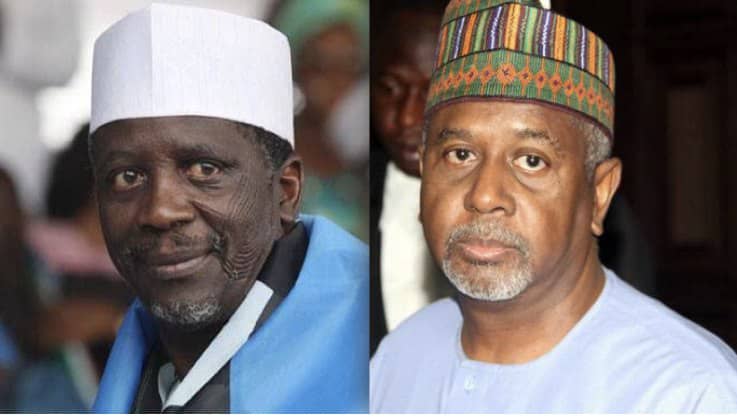An officer of the Economic and Financial Crimes Commission (EFCC), Kazeem Yusuf, has told the FCT High Court that N4.6 billion arms fund was allegedly diverted for ‘prayer against insecurity’ and luxury cars, among other things.
Mr Yusuf testified as the second prosecution witness (PW2) in the former Minister of State for Finance Bashir Yuguda’s trial.
Others charged in the case are former National Security Adviser (NSA) Sambo Dasuki (retired); former Sokoto State Governor Attahiru Bafarawa; his son Sagir, a company and Dalhatu Investment Limited, owned by Mr Bafarawa.
EFCC charged them with 25 counts of misappropriation, criminal breach of trust and receiving stolen property.
Led in evidence by the EFCC counsel, Rotimi Jacobs, SAN, the witness told the court that based on a petition from the Office of the National Security Adviser (ONSA), former EFCC chairman Ibrahim Magu constituted a team to investigate the case of arms.
The witness told the court that during the investigation, EFCC discovered, ” Dalhatu Investment Limited was one of the 78 companies alleged to have received money from ONSA without any documents to show that they bided for contracts.”
He said no documents showed a contractual agreement between the companies and ONSA.
Mr Yusuf stated that an analysis of the statement of account of Dalhatu Investment Limited got by EFCC from UBA revealed that the company got N4.6 billion.
He added that the amount was paid in instalments between 2014 and 2015 and that N783 million, part of the money, came from the SAS account. He further claimed that Mr Sagir represented the company.
“He told the EFCC team in his statement that the money was meant for prayers for the country because of the insecurity that was prevalent at that time,” the witness said.
According to the witness, Mr Sagir later gave a breakdown of how the N4.6 billion was spent, including a list of beneficiaries.
The witness listed the beneficiaries as Abdallah Wali, who received N580 million from the company, which he (Mr Wali) later told EFCC that the money was meant for his gubernatorial election in Sokoto in 2015.
He also told the EFCC team that Muazu Madawaki received N322 million and was invited. He told investigators that the amount was for the payment of Hajj for some Sokoto State indigenes.
Among the beneficiaries listed, according to the witness, were the Sokoto State chairman of the Peoples Democratic Party (PDP) then, Ibrahim Maigoma (N111million); Yahaya Ahmed Dada (N327,549,000); Sani Kabir (N159million); INEC (N293,500,000), among others.
PW2 added that the money received by Mr Wali was sent through a company, Development Strategies International Limited, owned by Islam Wali and Mohammed Wali, both cousins to Mr Wali.
The witness told the court that parts of the money meant for supplies of security equipment, including hand-held devices, were used to procure a Lexus car.
He also added a Hilux van and 16 Peugeot 206 cars were distributed to PDP local government chairmen in Sokoto State. However, he stated that EFCC recovered 14 Peugeot 206 vehicles during the investigation.
The witness said one Amanze Obi received N15.3 million for political publicity for Attahiru Bafawara’s 2015 presidential campaign.
He further told the court that about £123,000 was transferred to a bank in the United Kingdom to offset a mortgage for Mr Bafarawa, and N1 billion went to Bureaux de Change (BDCs) to convert to dollars.
The witness added that the N4.6 billion came to Dalhatu Investment Limited from the ONSA and SAS accounts, adding that the amount was sent to the company’s UBA
account.
” We wrote a letter to the then NSA, Major-General Mohammed Monguno. He confirmed that the monies were just diverted without executing any contracts,” the witness said.
PW 2 further told the court that the N4.6 billion paid to Dalhatu Investment Limited was not used for the purpose it was meant for.
“I discovered, for instance, that N322 million transferred to (Muazu) Madawaki was used for Hajjpurposese.
” There is nothing in Exhibit A to suggest that money was meant to sponsor people to Hajj,” Mr Yusuf said.
Mr Yusuf added that the defendants were invited by EFCC for interviews and statements, informing that they all showed up at the commission and volunteered their statements.
He told the court that Mr Bafarawa came to EFCC, where he was interviewed and wrote his statement voluntarily.
“We invited Sagir Attahiru for an interview and took his statements. We investigated his statement of account and transactions,” said the witness.
When the prosecuting counsel sought to tender Mr Attahiru’s statements through the witness, his counsel, J.O Olatoke, SAN, objected to their admissibility on the ground that they were not voluntarily obtained.
Mr Olatoke told the court that the statements were made based on inducement, intimidation, receipt and invitation to settlement.
He, therefore, prayed the court to grant them trial-within-trial to determine the voluntariness of the statements.
Based on this, Justice Yusuf Halilu ordered a trial-within-trial to determine the voluntariness of the statements made by Mr Attahiru.
He subsequently adjourned the trial until February 14.
(NAN)






Leave a Reply